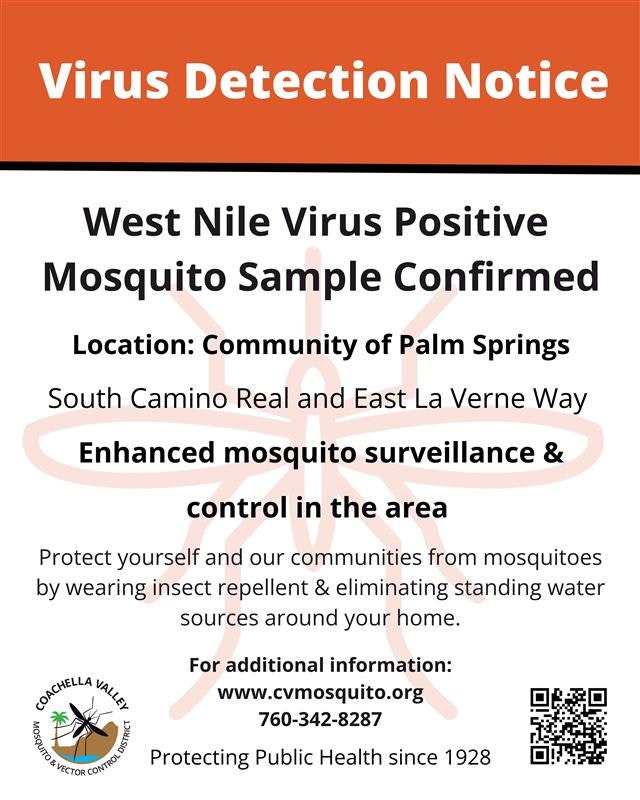Mosquito Sample Tests Positive for West Nile Virus; Aerial Treatments Planned
Recent Rain and Cooler Temperatures Contribute to Spike in Mosquito Activity
Coachella Valley, Ca: Mosquitoes collected from a routine surveillance trap in the City of Palm Springs, near the intersections of South Camino Real and East La Verne Way, have tested positive for West Nile virus (WNV). This is the first WNV-positive mosquito sample reported in Palm Springs this year and the eleventh in the Coachella Valley.
So far this year, 106 mosquito samples in the Coachella Valley have tested positive for mosquito-borne viruses, with 95 of them testing positive for St. Louis encephalitis virus. At the same time last year, 203 samples had tested positive for West Nile virus with no detections of St. Louis encephalitis virus.
In response, District staff have posted disease advisory signs in the affected communities and will conduct ground and aerial treatments to reduce mosquito populations and prevent further spread of mosquito-borne viruses. No human cases of mosquito-borne illness have been reported in the Coachella Valley so far this year.
Lower daily temperatures and recent rainfall have created ideal breeding conditions for mosquitoes. The Coachella Valley Mosquito and Vector Control District urges residents to take simple actions to reduce mosquito populations around their home.
“We recommended that everyone walk around their property weekly and dump any containers holding water. Buckets and flowerpot saucers are some of the most common mosquito breeding sources”, said Gregorio Alvarado, Operations Manager for the District.
The District also recommends the use of EPA-registered insect repellents that contain at least 30% DEET, picaridin, oil of lemon eucalyptus, or IR3535. Essential oils and citronella candles are not recommended for protection.
About West Nile Virus
West Nile virus (WNV) spreads when a female mosquito bites an infected bird and becomes a carrier. The infected mosquito can then transmit the virus to humans. Most people who contract WNV do not develop any symptoms. However, some may develop fever, headaches, and body aches. In severe cases, hospitalization may be required, and in rare instances, the virus can be fatal. Anyone experiencing symptoms should contact their healthcare provider.
WNV PS 10.2.25WNV PS Spanish 10.2.25

